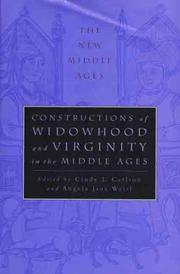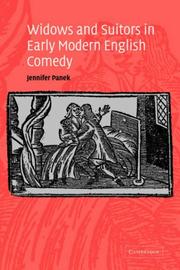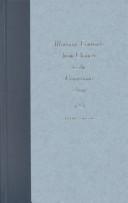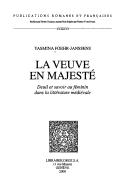| Listing 1 - 9 of 9 |
Sort by
|
Book
ISBN: 9791035100940 Year: 2018 Publisher: Paris : Éditions de la Sorbonne,
Abstract | Keywords | Export | Availability | Bookmark
 Loading...
Loading...Choose an application
- Reference Manager
- EndNote
- RefWorks (Direct export to RefWorks)
Widows in art. --- Widows in literature. --- Social perception. --- Widowhood --- Social representations --- Représentations sociales --- Veuvage --- History --- Histoire

ISBN: 0312211368 Year: 1999 Publisher: New York St. Martin's
Abstract | Keywords | Export | Availability | Bookmark
 Loading...
Loading...Choose an application
- Reference Manager
- EndNote
- RefWorks (Direct export to RefWorks)
To be a virgin or a widow never promised a stable, uniform status to a woman during the Middle Ages. Rather, these positions were areas of contestation; constructions that did, and still do, create and interrogate notions of gender roles, areas of power, and areas of disability. Chastity, for one example, is an apparent given for both positions, but chastity at the time invoked any number of cultural meanings and practices. The essays in Constructions of Widowhood and Virginity in the Middle Ages address many facets of these two positions specific to women in medieval literature.(Book jacket)
Chastity in literature --- Literature, Medieval --- Virginity in literature --- Widows in literature --- Women and literature --- History and criticism --- History

ISBN: 9780511483868 9780521832717 9780521036627 0511230559 9780511230554 9780511231322 0511231326 0511228937 9780511228933 0511229771 9780511229770 0511483864 0521832713 1280703059 9781280703058 0521832713 0521036623 1107160782 0511316593 Year: 2004 Publisher: Cambridge, UK ; New York : Cambridge University Press,
Abstract | Keywords | Export | Availability | Bookmark
 Loading...
Loading...Choose an application
- Reference Manager
- EndNote
- RefWorks (Direct export to RefWorks)
The courtship and remarriage of a rich widow was a popular motif in early modern comic theatre. Jennifer Panek brings together a wide variety of texts, from ballads and jest-books to sermons and court records, to examine the staple widow of comedy in her cultural context and to examine early modern attitudes to remarriage. She persuasively challenges the critical tendency to see the stereotype of the lusty widow as a tactic to dissuade women from second marriages, arguing instead that it was deployed to enable her suitors to regain their masculinity, under threat from the dominant, wealthier widow. The theatre, as demonstrated by Middleton, Dekker, Beaumont and Fletcher and others, was the prime purveyor of a fantasy in which a young man's sexual mastery of a widow allowed him to seize the economic opportunity she offered.
English drama --- Widows in literature. --- English drama (Comedy) --- Courtship in literature. --- History and criticism. --- Drama --- Thematology --- English literature --- anno 1600-1699 --- Arts and Humanities --- Literature
Book
ISBN: 9780719087561 9781526111654 1526111659 9781781707296 1781707294 0719087562 1781706859 9781781706855 Year: 2015 Publisher: Manchester : Manchester University Press,
Abstract | Keywords | Export | Availability | Bookmark
 Loading...
Loading...Choose an application
- Reference Manager
- EndNote
- RefWorks (Direct export to RefWorks)
Women outside marriage between 1850 and the Second World War were seen as abnormal, threatening, superfluous and incomplete, whilst also being hailed as 'women of the future'. Before 1850 odd women were marginalised, minor characters, yet by the 1930s spinsters, lesbians and widows had become heroines. This book considers how Victorian and modernist women's writing challenged the heterosexual plot and reconfigured conceptualisations of public and private space in order to valorise female oddity.
English fiction --- Women in literature. --- Single women in literature. --- Widows in literature. --- Lesbians in literature. --- History and criticism. --- Women authors --- Woman (Christian theology) in literature --- Women in drama --- Women in poetry --- Women in literature --- Single women in literature --- Widows in literature --- Lesbians in literature --- English literature --- History and criticism --- Women authors&delete& --- English --- Languages & Literatures --- English Literature
Book
ISBN: 9789004191396 9004191399 9789004191709 9004191704 1283120232 9786613120236 Year: 2010 Volume: 40 Publisher: Leiden ; Boston : Brill,
Abstract | Keywords | Export | Availability | Bookmark
 Loading...
Loading...Choose an application
- Reference Manager
- EndNote
- RefWorks (Direct export to RefWorks)
Based on clerical ideals of female comportment and Golden Age playwrights’ fixation on questions of honor, modern scholarship, whether historical or literary, has viewed women as subjects and objects of patriarchal control. This study analyzes tensions and contradictions produced by the interplay of patriarchal norms and the realities of widows’ daily lives to demonstrate that in Castile patriarchy did not exist as a monolithic force, which rigidly enforced an ideology of female incapacity. The extensive analysis of archival documents shows widows actively engaged in their families and communities, confounding images of their reclusion and silence. Widows’ autonomy and authority were desirable attributes that did not collide with the demands of a society that recognized the contingent nature of patriarchal norms.
History of Spain --- anno 1500-1599 --- Social role --- Widowhood --- Widows in literature --- Widows --- Role, Social --- Social psychology --- Social status --- Marital status --- Women --- Life cycle, Human --- History --- History. --- Legal status, laws, etc. --- Social conditions --- Spain --- Social life and customs --- Role (Sociology)
Book
ISBN: 1438458215 9781438458212 9781438458199 1438458193 1438458207 Year: 2015 Publisher: Albany, New York : SUNY Press,
Abstract | Keywords | Export | Availability | Bookmark
 Loading...
Loading...Choose an application
- Reference Manager
- EndNote
- RefWorks (Direct export to RefWorks)
The death of a beloved spouse after a lifetime of companionship is a life-changing experience. To help understand the reality of bereavement, Jeffrey Berman focuses on five extraordinary American writers—Joan Didion, Sandra Gilbert, Gail Godwin, Kay Redfield Jamison, and Joyce Carol Oates—each of whom has written a memoir of spousal loss. In each chapter, Berman gives an overview of the writer's life and art before widowhood, including her early preoccupation with death, and then discusses the writer's memoir and her life as a widow. He discovers that writing was, for all of these authors, both a solace and a lifeline, enabling them to maintain bonds with their lost loved ones while simultaneously moving on with their lives. These memoirs of widowhood, Berman maintains, reveal not only courage and resilience in the face of loss, but also the critical role of writing and reading in bereavement and recovery.
American literature --- Widows in literature. --- Bereavement in literature. --- Widows' writings. --- Widowhood --- Autobiography --- Life cycle, Human --- Writings of widows --- Literature --- English literature --- Agrarians (Group of writers) --- Women authors --- History and criticism. --- Psychological aspects. --- Authorship.

ISBN: 0813031052 9780813031057 9780813021027 0813021022 Year: 2001 Publisher: Gainesville : University Press of Florida,
Abstract | Keywords | Export | Availability | Bookmark
 Loading...
Loading...Choose an application
- Reference Manager
- EndNote
- RefWorks (Direct export to RefWorks)
''A fine historic exploration of why marriage treatments in literary texts are transformed between the 14th and 16th centuries. . . . This volume has the power and evidence--both historic and textual--to revamp our understanding of crucial texts. .
English literature --- Marriage in literature. --- English drama --- Mysteries and miracle-plays, English --- Marriage customs and rites in literature. --- Prenuptial agreements in literature. --- Adultery in literature. --- Widows in literature. --- Antenuptial contracts in literature --- History and criticism. --- Chaucer, Geoffrey, --- Chaucer, Jeffrey, --- Chʻiao-sou, Chieh-fu-lei, --- Chieh-fu-lei Chʻiao-sou, --- Choser, Dzheffri, --- Choser, Zheoffreĭ, --- Cosvr, Jvoffrvi, --- Tishūsar, Zhiyūfrī, --- Views on marriage. --- Adultery in literature --- Marriage customs and rites in literature --- Marriage in literature --- Mysteries and miracle plays, English --- Prenuptial agreements in literature --- Widows in literature --- History and criticism
Book
ISBN: 033374912X Year: 1999 Volume: *3 Publisher: Basingstoke London Macmillan
Abstract | Keywords | Export | Availability | Bookmark
 Loading...
Loading...Choose an application
- Reference Manager
- EndNote
- RefWorks (Direct export to RefWorks)
Chastete dans la litterature --- Chastity in literature --- Kuisheid in de literatuur --- Maagdelijkheid in de literatuur --- Veuves dans la littérature --- Virginity in literature --- Virginité dans la littérature --- Weduwen in de letterkunde --- Widows in literature --- Literature [Medieval ] --- History and criticism --- Women and literature --- Europe --- History --- To 1500 --- FEMMES ET LITTERATURE --- VIRGINITE DANS LA LITTERATURE --- CHASTETE DANS LA LITTERATURE --- VEUVES DANS LA LITTERATURE --- EUROPE

ISSN: 00797812 ISBN: 260000422X 9782600004220 Year: 2000 Volume: 226 Publisher: Genève: Droz,
Abstract | Keywords | Export | Availability | Bookmark
 Loading...
Loading...Choose an application
- Reference Manager
- EndNote
- RefWorks (Direct export to RefWorks)
Romance literature --- Thematology --- anno 1200-1499 --- Deuil--Coutumes dans la littérature --- Literature [Medieval ] --- Literatuur [Middeleeuwse ] --- Littérature médiévale --- Medieval literature --- Middeleeuwse literatuur --- Mourning customs in literature --- Rouwgebruiken in de literatuur --- French literature --- Latin literature, Medieval and modern --- Widows in literature --- Bereavement in literature --- Littérature française --- Littérature latine médiévale et moderne --- Veuves dans la littérature --- Deuil dans la littérature --- History and criticism --- Histoire et critique --- Literature, Medieval --- Women in literature --- Grief in literature --- 82.04 --- 840 "04/14" --- Belgian literature (French) --- -Belgian literature (French) --- -French literature --- Belgian literature --- Literaire thema's --- Franse literatuur--Middeleeuwen --- Belgian authors --- -Literaire thema's --- 840 "04/14" Franse literatuur--Middeleeuwen --- 82.04 Literaire thema's --- -82.04 Literaire thema's --- Littérature française --- Littérature latine médiévale et moderne --- Veuves dans la littérature --- Deuil dans la littérature --- Woman (Christian theology) in literature --- Women in drama --- Women in poetry --- French literature - To 1500 - History and criticism --- Literature, Medieval - History and criticism
| Listing 1 - 9 of 9 |
Sort by
|

 Search
Search Feedback
Feedback About UniCat
About UniCat  Help
Help News
News